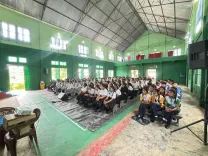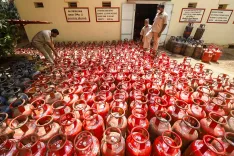Is There a Surge in Household Loans in S. Korea Despite Real Estate Restrictions?

Synopsis
Key Takeaways
- Household loans in South Korea rose by 4 trillion won in August.
- Government restrictions have been implemented to control household debt.
- The LTV ratio is currently at 50 percent, with potential tightening to 40 percent.
- The jeonse system allows for large returnable deposits instead of monthly rent.
- South Korean banks are maintaining higher interest margins amidst tighter regulations.
Seoul, Aug 31 (NationPress) Household loans granted by South Korean banks saw an increase of over 4 trillion won ($2.87 billion) in August, as reported on Sunday. This rise occurred despite stringent measures introduced earlier this year aimed at controlling soaring household debt and escalating housing prices.
As of Thursday, household loans experienced a growth of 4.2 trillion won this month, a significant rise from the 2.2 trillion won increase recorded in July, which had been the smallest growth since March, according to Yonhap news agency.
In a bid to manage rising household debt and housing prices, authorities imposed a cap of 600 million won on mortgage loans for property purchases in the capital region last June, alongside a suspension of home-backed loans for those owning multiple homes.
The uptick in August can be attributed to an increase in unsecured loans and various other household loan types.
While the government believes that the recent restrictions have somewhat mitigated the market's overheating, there are discussions about implementing further regulations for the real estate market, including a possible tightening of the loan-to-value (LTV) ratio, as noted by market observers.
The LTV ratio serves as a crucial regulatory measure to limit household loans, as it caps the maximum borrowing amount based on the value of the collateral.
Currently, the ratio stands at 50 percent for anti-speculation areas in Seoul, with experts predicting a stricter ceiling of 40 percent.
Lee Eog-weon, nominated as the chairman of the Financial Services Commission, stated that the government will maintain a vigilant watch over the housing market and will take further actions as deemed necessary.
"Many analyses suggest that the measures implemented on June 27 have yielded short-term success in light of rising household debt linked to mortgages in the greater Seoul area," Lee mentioned in a written statement to parliament during his confirmation hearing.
"However, there are also views that merely regulating loans may limit the policy's effectiveness," Lee continued. "Upon taking office, I will focus on this matter and fulfill my responsibilities diligently."
Lee highlighted the necessity for the government to undertake a "comprehensive consideration" regarding the potential tightening of restrictions on loans for the jeonse system.
The jeonse system is a unique Korean rental arrangement where tenants provide landlords with a substantial refundable deposit in lieu of monthly rent.
"We will keep a close eye on housing market trends and household loans, and swiftly implement necessary measures that are currently being prepared," Lee added, clarifying that no decisions have been made regarding additional regulations.
Meanwhile, the net interest margins of South Korea's top five banks, reflecting the difference between interest received and paid, have approached the highest levels since 2022, following mandatory public disclosures by financial regulators.
This widening gap appears to stem from banks refraining from lowering lending rates amid tighter government control of household debt, while deposit rates have dipped to their lowest in over three years.









